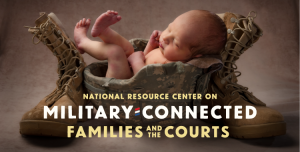The National Council of Juvenile and Family Court Judges (NCJFCJ) held a virtual roundtable discussion last month with representatives from organizations, programs, and agencies serving military-connected families. The two-day roundtable discussion was held to further the NCJFCJ’s efforts to improve support for military-connected families that are involved in the juvenile and family court system. To this end, national-level entities that work with military-connected families were brought together to network, create new or enhance existing connections across organizations, and share information on resources, programs, and training opportunities.
Over the course of the roundtable, nearly 50 participants discussed access to behavioral health and substance use resources for military families, approaches for juvenile and family courts to work with local military installations, and resources that exist or are needed to support and engage military families in the court system.
Roundtable participants included representatives from a broad range of civilian organizations, military programs, and offices within the federal government, namely the Clearinghouse for Military Family Readiness, the National Children’s Alliance, Justice for Vets, National Organization for Victim Assistance, the National Military Family Association, the National Child Traumatic Stress Network, Zero to Three, the Battered Women’s Justice Project, the National Center on the Sexual Behavior of Youth, Family Advocacy Programs and JAG Corps staff from military installations, the Department of Defense Office of Military Family Readiness Policy, the Office of Juvenile Justice and Delinquency Prevention, and the Substance Abuse and Mental Health Services Administration. Participants also included NCJFCJ judges, Military Committee members, and staff.
 The roundtable was the most recent activity in NCJFCJ’s Military-Connected Families and the Courts Project, which began in 2018 with funding from the State Justice Institute (SJI). The project’s overall goal is to provide training, technical assistance, and resources to help strengthen collaboration and coordination across state court system professionals, civilian organizations, and military installations in order to better serve military families involved in the juvenile and family courts.
The roundtable was the most recent activity in NCJFCJ’s Military-Connected Families and the Courts Project, which began in 2018 with funding from the State Justice Institute (SJI). The project’s overall goal is to provide training, technical assistance, and resources to help strengthen collaboration and coordination across state court system professionals, civilian organizations, and military installations in order to better serve military families involved in the juvenile and family courts.
An ongoing activity involves providing judges with specialized training and resources on the unique issues of military-connected families as they relate to custody, visitation, family violence, and juvenile justice, including the impact of PTSD. Also, the NCJFCJ is working with two demonstration sites, San Diego County Courts and Marine Corps Base Camp Pendleton and the Hardin County Courts and Fort Knox Army Base, on developing agreements to collaborate, share information, and provide training and resources to support military-connected families in the court system.

In 2019, the project’s activities included creating the National Resource Center on Military-Connected Families and the Courts, which serves as a repository for tools, publications, and other materials to assist civilian and military professionals working with military families. The NCJFCJ’s Second National Summit on Courts and Military-Connected Families also took place in 2019. Held at Fort Knox, the Summit facilitated learning and discussion across those in both civilian and military systems who engage in direct service to h justice-involved service members and their families. The report and recommendations from the Summit can be found here.
This virtual roundtable discussion was developed under grant SJI-18-P-014 from the State Justice Institute. The points of view expressed are those of the NCJFCJ and/or the Roundtable Discussion participants and do not necessarily represent the official position or policies of the State Justice Institute.